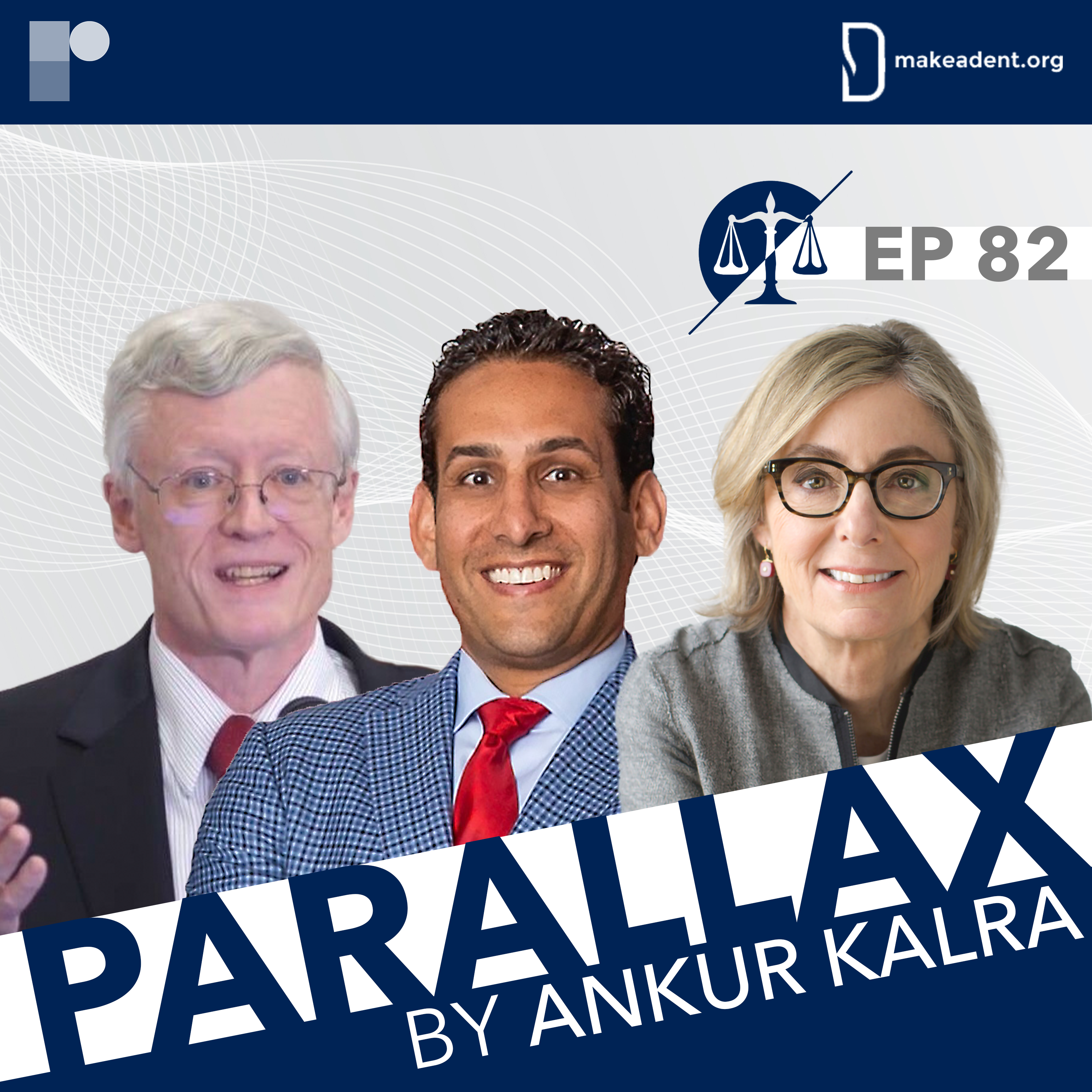
“Sham peer review or malicious peer review is defined as the abuse of a medical peer review process to attack a doctor for personal or other non-medical reasons.”
“Most doctors — warns Dr Kaki — do not understand that ultimately your privileges are not dictated by your colleagues through a fair process, but hospital administration controls our destiny”. In 2018, Dr Kaki was subject to a campaign of retaliation that set out to revoke the well-respected cardiologist’s privileges. Today, Dr Kaki is Director of Mechanical Circulatory Support at Ascension and Clinical Associate Professor at Wayne State University School of Medicine.
In this week’s Parallax Dr Kalra’s guests are the team that fought for justice in Dr Kaki’s case: Dr Lawrence R. Huntoon, Editor-in-Chief of the Journal of the Association of American Physicians and Surgeons and Deborah Gordon, employment attorney.
Dr Kaki walks us through his Kafkaesque experience and the knowledge he acquired during his battle with his former hospital. We get insight into the stages of a peer review process and the role of key stakeholders. Dr Huntoon, expert in this field, helps us put Dr Kaki’s experience in context and talks about the prevalence of sham peer reviews through shocking cases. Ms Gordon supports the discussions with practical tips and insights on the role of an attorney. Join Ankur and his guests for a must listen show on your rights as a physician.
What do you need to know about the hospital peer review process and your rights? What can you do if targeted? What is Dr Kaki’s advice to physicians?
Resource: https://shmpublications.onlinelibrary.wiley.com/doi/10.1002/jhm.12903
Stay tuned for Part 2 of Parallax’s Medico-Legal series with Dr Kalra and Dr Huntoon.
Questions and comments can be sent to “podcast@radcliffe-group.com” and may be answered by Ankur in the next episode.
Guests: @DrAmirKaki, Dr Lawrence R Huntoon and Deborah Gordon host: @AnkurKalraMD and produced by: @RadcliffeCARDIO.

What do you need to know about hospital investigations? What is the difference between OPPE and FPPE? How can you get educated on hospital bylaws and processes?
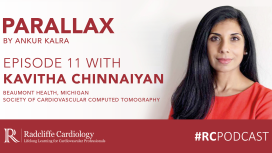
In the final episode of our burnout and resilience series, Kavitha and Ankur give you some practical tools of self-care to help you avoid burnout. Kavitah Chinnaiyan, MD, is an award-winning author and, Cardiologist and Director of Cardiac CT Research at Beaumont Health, MI. Send us your thoughts to this episode for Ankur to share in future episodes: podcast@radciffe-group.com. Guest @ChinnaiyanMD.
Hosted by @AnkurKalraMD. Produced by @RadcliffeCARDIO.
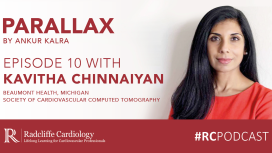
In our second episode on burnout and resilience, Kavitah Chinnaiyan, MD, and Ankur take a deeper dive into mindfulness and training the brain to move from Default-Mode to Task-Positive Networks. Kavitah is an award-winning author and, Cardiologist and Director of Cardiac CT Research at Beaumont Health, MI. Send us your thoughts to this episode for Ankur to share in future episodes: podcast@radciffe-group.com. Guest @ChinnaiyanMD.
Hosted by @AnkurKalraMD. Produced by @RadcliffeCARDIO.
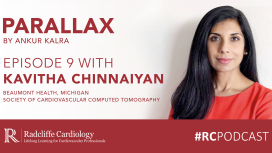
Hosted by @AnkurKalraMD. Produced by @RadcliffeCARDIO.
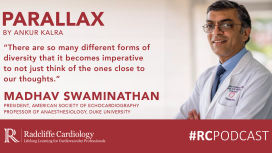
Ankur and Madhav also discuss positive traits of leadership, why we should embrace failure and the importance of mentorship throughout all stages of one’s medical career. Send us your comments to this episode for Ankur to share in future episodes: pocast@radciffe-group.com. Guest @mswami001.
Hosted by @AnkurKalraMD. Produced by @RadcliffeCARDIO.
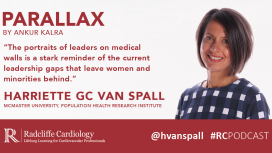
Harriette is an Associate Professor of Medicine at the Department of Medicine, Cardiology and the Department of Health Research Methods, Evidence and Impact at McMaster University and the Population Health Research Institute in Hamilton, ON, Canada. In this episode, Ankur and Harriette discuss why this issue is so contentious, what the current state of medical walls represents, why this may be an issue and what alternative medical walls could look like. Harriette also shares her thoughts on how this topic relates to the maintenance of hierarchical power structures in academic institutions, calling for more collaborative leadership and management styles. Guest @hvanspall.
Hosted by @AnkurKalraMD. Produced by @RadcliffeCARDIO.

In this episode, Ankur and Danielle speak about the evidence in favour of a whole-food plant-based diet to improve cardiovascular health, the ACC prevention guidelines, how to talk to patients about positive dietary change, the issue of lack of nutrition training in cardiovascular fellowships and what Danielle’s diet looks like as a busy whole-food plant-based cardiology fellow. On her own podcast ‘Nutrition Rounds’ Danielle has discussions about evidence-based plant-based nutrition with physicians who are leading experts in nutrition and health.
Hosted by @AnkurKalraMD. Produced by @RadcliffeCardiology.

In this brilliant conversation, Ankur, Emmanouil and Michael unravel the potential advantages, challenges and practical realities of using drug-coated balloons in SVD, and the findings of the latest randomised controlled trials studying this area.
Hosted by @AnkurKalraMD. Produced by @RadcliffeCardiology. [Disclaimer: The use of drug-coated balloons in coronay intervention is still off-label; it has not been approved by the FDA.]

Dawn is an associate editor of the journal Circulation: Cardiovascular Interventions and is widely known for her research program on PCI and peripheral arterial disease (PAD). Ankur and J. Dawn discuss multiple trials/studies that were published in 2018, including ORBITA, PIONEER-II and ABSORB. J. Dawn also shares her thoughts on the latest stent technologies.
Hosted by @AnkurKalraMD. Produced by @RadcliffeCardiology.

They discuss the importance of preventative medicine, their experience of reducing hypertension with non-pharmaceutical and pharmaceutical methods, and the significance of the integrated “team approach” when treating comorbid conditions such as hypertension. Athena also shares her thoughts on cardiologists’ responsibility to shape their patients’ lifestyle choices.
Hosted by @AnkurKalraMD. Produced by @RadcliffeCardiology.

Chest pain is one of the most common reasons for an emergency room visit in the US, with almost 6 million ER visits annually, yet there is no consensus on how to compare the results from various hscTn assays. Tune in to hear Santiago outline the advantages and limitations of using hscTn as a standard biomarket to evaluate patients with suspected ACS in the ER.
Hosted by @AnkurKalraMD. Produced by @RadcliffeCardiology.
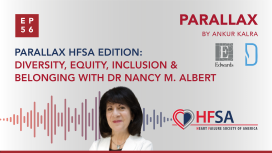
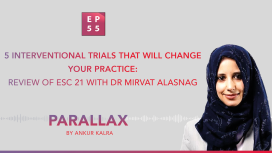
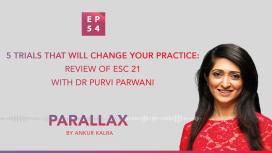
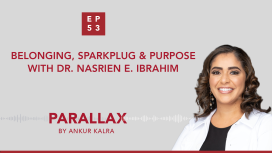
In this candid episode of Parallax, Nasrien and Ankur open up about their experiences of being an immigrant. Ankur asks Nasrien about her journey to medicine. Nasrien shares the lessons she took away from her years under the mentorship of Dr JoAnn Lindenfeld and later, Dr. James Januzzi. Finally, Nasrien shares her recent experience of writing Sparkplug and how she embraced life with its imperfections and found her purpose.
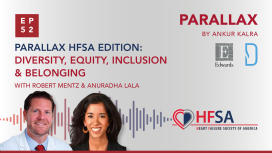
In this practical and insightful episode, Dr Kalra asks what does diversity, equity, inclusion and belonging mean to the editorial board of JCF and what were the steps taken to put these principles into practice.





